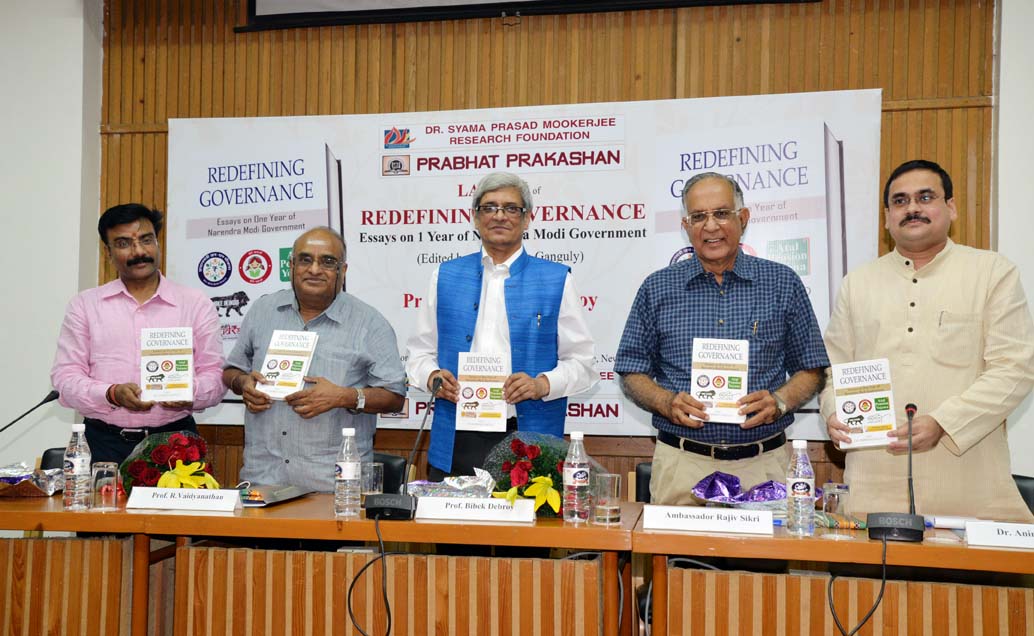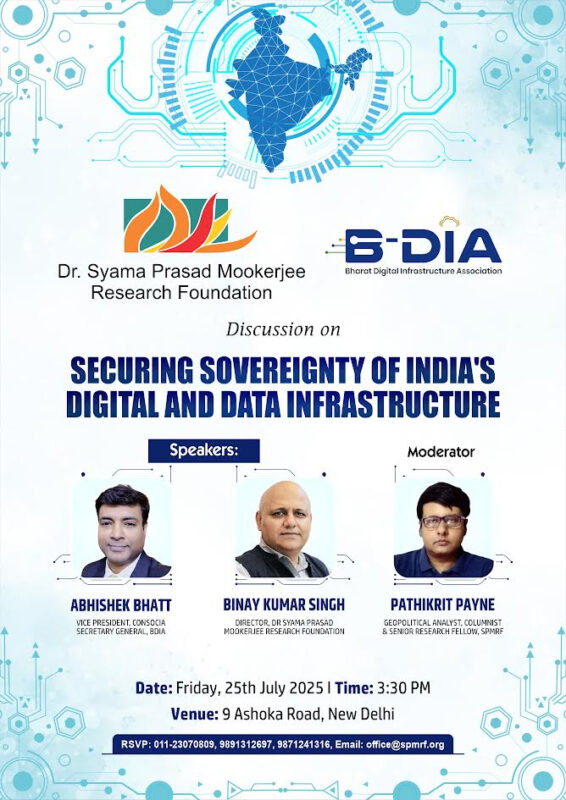A Report :-
“Redefining Governance; Essays on 1 Year of Narendra Modi Government” edited by Dr. Anirban Ganguly, Director SPMRF, was released on 3rd September, 2015 at the India International Centre, New Delhi. The book is a compilation of 34 essays covering a range of issues based on one year of Modi government and its impact on governance. Professor Bibek Debroy, Member, NITI Aayog, released the book in presence of Professor R. Vaidyanathan, Professor of Finance at IIM Banglore and Ambassador Rajiv Sikri former Secretary, Ministry of External Affairs, Government of India.
At the launch of the book while addressing the gathering, Professor Bibek Debroy said that these days if nothing happens then it is blamed on LG and what he meant by LG was the Land Bill and GST bill. But there is plenty more that is going on. So that’s why he also complemented the Prabhat Prakashan and Dr. Anirban Ganguly for bringing out this book. He also said that there is no government after independence which has been scrutinized so much within the first year of its tenure. Some of the most significant changes which are not talked about by our political commentators have been covered in the book. He started with NITI Aayog. He said, “Quite often I meet with people and people ask me what NITI is planning to do for India and the States and I always reply why we should decide. One of the most important thing that’s has happened is the change in the whole institutional structure. There are 3 sub-groups of chief ministers that have been constituted for various issues. So it is not the PM who is deciding, it is not the PMO which is deciding, it is the CMs who are deciding how the central schemes will be implemented and what kind of policy States want in future.”
Another example of which he gave was of smart city. What is the smartness about the smart cities? These cities have been chosen by the states. He said that smartness does not come about from the X amount of money Union government is going to spend. The smartness is for us as citizens to decide and figure out the plans.
He also touched upon the schemes like PMJDY and associated social security insurance schemes. He also pointed out the relevance of SECC data.
On GST, he said that why there is 1% extra tax because the producing state wanted it and not the centre. It is not something that North Block wanted. He gave all these examples to drive home the point that the most significant change that has happened is the decentralization, devolution and the decision making in Delhi. Professor Debroy also pointed out how obsolete laws were being withdrawn and how this was a significant achievement of this government among others.
While speaking on the occasion, Prof. R. Vaidyanathan highlighted the importance of MUDRA Bank and said that future of Indian economy is very bright because direction and objectives are clear. He compared PM Modi to Lee Kuan Yew of India. He said that it will take some time to change the track because the old Nehruvian mindset is still ruling the country.
Amb. Rajiv Sikri also addressed the gathering on the occasion. He highlighted the dynamism in the foreign policy of India in last one year. He said, “Even the critics of PM Modi would have to concede that his foreign policy has been truly dynamic and imaginative and it has given much needed and long awaited coherent direction. In the globalised world of today it is absolutely essential for the chief executive of the country to be seen and heard because he is the face of the country. PM Modi has brought a new self confidence and ambition in India’s foreign policy.”
Dr. Anirban Ganguly, Director SPMRF, introduced the book and delved on the governance philosophy of Antyodaya that inspires the Modi model of governance. He also proposed the vote of the thanks expressing his gratitude to all the contributors.
The programme was attended by a cross section of academia, bureaucracy, former servicemen and diplomats, young scholars, intellectuals and others.
(The views expressed are the author's own and do not necessarily reflect the position of the organisation)


